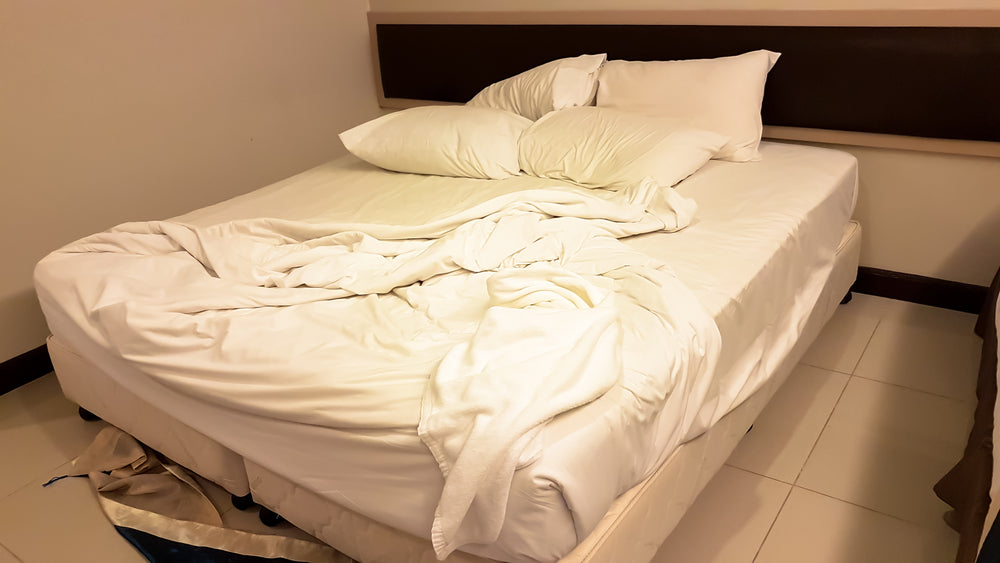Free U.S. Shipping On Orders Over $150

5 Serious Health Problems You Could Get from Dirty Bedding
Posted on
Dirty bedding is more dangerous for your health than most people think. Sleeping for hours each night in a soup of dirt, dust mites, bacteria and fungi is as bad as it sounds.
We’ve covered before how bedding like sheets and comforters can be a lot dirtier than they seem. They quickly build up with body oils, sweat, dirt, dead skin cells and allergens like dust mites. Add in warmth and moisture from your body and your bedding becomes a cozy habitat for bacteria, fungi and other germs.
The most common sign of dirty bedding is a funky smell. But smelly bedding is the least of your worries. Here are five serious health problems that can be caused by dirty bedding.
1. Cystic Acne
Acne occurs when dirt, sweat, dead skin cells and other gunk clog the skin pores. If you are prone to acne, dirty bedding can cause recurrent breakouts. Your pillowcase could very well be the culprit behind your never-ending acne breakouts.
Dirty sheets and comforters can also cause acne on other areas of your body such as your chest and back.
Dirty bedding is also home to bacteria. If this bacteria infects your acne, it turns into a particularly painful type of acne called cystic or inflammatory acne. You develop painful pimples filled with pus.
2. Yeast and Fungal Infections
Bacteria and fungi on dirty bedding can reach your nether regions and cause infections. You are especially at risk if you sleep naked or in your underwear.
Researchers have found bacteria that causes urinary tract infections on bedding. Fungi on dirty bedding can also cause a yeast infection. Other infections you can get from dirty bedding include athlete’s foot, thrush, and jock itch.
And don't forget about viruses, too. If your partner has a cold or flu, viruses can linger on bedding and you could get infected too. That’s why it is important to sanitize clothes and bedding when doing laundry, especially if there’s a sick person at home.
3. Asthma Attacks
If you have asthma, unwashed bedding can trigger asthma attacks. This happens when you breathe in allergens that have accumulated on the bedding like dust mites, pet hair and mold spores.
Researchers have also found that certain fungi can act as allergens and trigger or worsen asthma symptoms.
4. Respiratory Allergies
The same particles that trigger an asthma attack can also cause allergic reactions. If you get in bed and immediately get a stuffy nose, start scratching your eyes or feeling itchy in your throat, your bedding could be home to allergens.
Allergies tend to get worse in the spring and summer when there is an increase of dust mites, mold, pollen and dust. These allergens can quickly build up on unwashed bedding.
5. Eczema
Other than acne, another serious skin problem that dirty bedding can cause is eczema. If you have a history of eczema, allergens and bacteria on your sheets can cause frequent flare ups.
While it is not deadly, eczema can be irritating since it causes itching. It interferes with sleep, resulting in even more health problems.
The Biggest Problem With Dirty Bedding
All the above are serious issues caused by unwashed bedding. But the biggest problem that most of us overlook is how dirty bedding interrupts sleep.
For one, your bed doesn't feel cozy and comfortable. You know that cozy, relaxing feeling of sleeping on clean, fresh sheets. Dirty sheets can cause the opposite feeling — discomfort and restlessness.
Then there are the effects of all the problems we’ve discussed above. If you are having constant asthma attacks, or allergy symptoms or the discomfort of a UTI, you are not going to sleep well. And this can have serious consequences for your overall health.
Chronic sleep deprivation is linked to a higher risk of diabetes, heart disease, cancer, depression and dementia among other physical and mental health problems.
So, yeah, you are risking a lot when you don't clean your bedding.
How to Keep Your Bed Clean and Safe
- Change and wash your bedding often. Change the sheets and pillowcase at least twice a week, the duvet cover once a week and the comforter once a month (you can go several months if you have a duvet cover).
- Use high quality bedding that is cool and breathable. Some sheets and comforters trap heat and moisture, creating a better environment for bacteria and fungi. Breathable and moisture-wicking bedding helps keep your bed more hygienic.
- Get antibacterial bedding that fights any bacteria that gets onto it. Here at Hercleon, we have the Jax sheets, the Jax comforter and the Jax pillowcase. Antibacterial bedding also helps keep your bed fresh by killing odor-causing bacteria.
- Keep the rest of your bedroom clean. Dust, mold and other particles can transfer onto your bed, even when you make efforts to keep your bedding clean.
- Be strict with your own hygiene. Wash hands regularly, don't get in bed with outside clothes, take a shower before you sleep, and don't eat or drink in bed.
Quick links
Contact
6063 Hudson Road #160
Woodbury, MN 55125
Yo@hercLeon.com
Leave a comment: